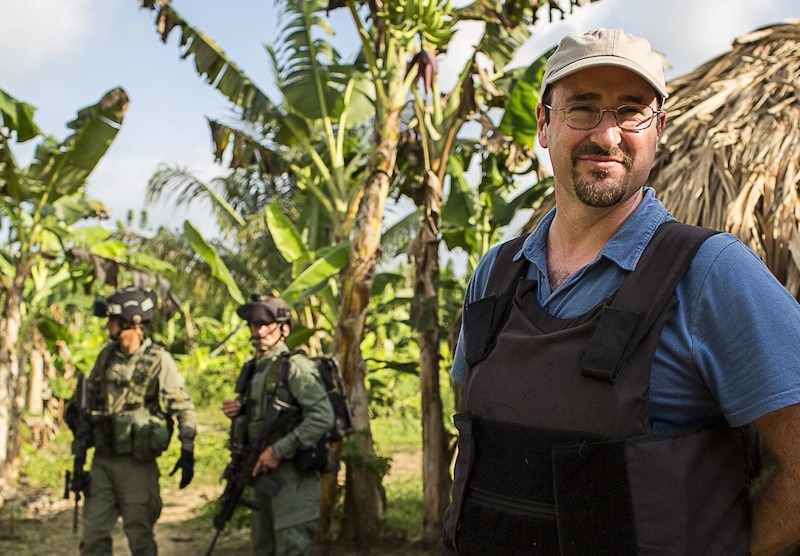 Nick Miroff doesn’t write about the happiest stories in the world. Soon after he started full-time at the Washington Post, there was the massacre at Virginia Tech. He covered opioid addiction in Appalachia before the rest of the country knew the devastating extent of the crisis. Earlier this year, he laid out what would happen to the 200,000 Salvadorans in the United States whose temporary protected status was revoked.
Nick Miroff doesn’t write about the happiest stories in the world. Soon after he started full-time at the Washington Post, there was the massacre at Virginia Tech. He covered opioid addiction in Appalachia before the rest of the country knew the devastating extent of the crisis. Earlier this year, he laid out what would happen to the 200,000 Salvadorans in the United States whose temporary protected status was revoked.
The Albany, N.Y. native, currently the Post’s national security correspondent, has spent the bulk of his reporting career south of the U.S. border, covering all of Latin America from Havana to Santiago.
Things got rolling for Miroff at UC Santa Cruz, where he studied Spanish and Latin American literature. He reported his first stories as a freelancer in Cuba, and then in 2003 pivoted to working in radio in Oakland. A year later, he hopped one city north to the UC Berkeley Graduate School of Journalism, from which he graduated in 2006.
When Miroff got to the J-School, Professor Lydia Chavez put him straight to work.
“Lydia had cultivated this relationship with the Oakland Tribune, and the Oakland Tribune was falling apart and looking for copy,” Miroff said. His work in her class — J200 — turned into a summer internship with the paper.
Chavez recalls “he had that real industriousness right from the get-go. You can tell when kids are going to succeed right off the bat.”
Miroff left North Gate Hall with “that kind of outsider mentality of the West Coast and the kind of humanistic values of Cal and the Bay Area,” along with the “sensibility of the professors who influenced me” — namely Chavez and her colleagues Cynthia Gorney and Adam Hochschild.
“I think what was really reinforced for me at Cal was to look for a different angle into stories that not everyone else was doing, to think more deeply about stories, and also to try and bring a real empathy to my reporting subject,” he said.
That all paid off when a Washington Post recruiter snapped him up for a summer internship. Not long after, the Post offered him a full-time gig as a reporter, and he and his wife packed up the old Subaru and drove across the country.
Miroff’s first taste of Latin America reporting came while stationed in Virginia’s Prince William County — “this booming area that was kind of on the edge of where the northeast corridor rubs up against the Old South.” There was an influx of Central Americans who were building the houses of the many post-9/11 national-security contractors moving to town. “The conservative traditional values of this area clashed with these new arrivals,” and he said the area became a flashpoint in what was then a new trend of local governments cracking down on illegal immigration.
Miroff was part of the Post’s reporting team that won the Pulitzer Prize for breaking news for coverage of the 2007 shooting rampage at Virginia Tech. After three years at the Metro desk, Miroff was named Latin America correspondent, a position that sent him to Havana and Mexico City. A series of stories on resource conflict in South America won him an Overseas Press Club award.
Miroff reflected on the Post’s roller-coaster fortunes since his tenure began. He arrived at the “tail-end of the grand era of the Post,” and survived attrition and buyouts. Morale dropped, and for a time “it was incredibly depressing.”
Staff was stunned, he recalled, when the Graham family sold the paper in 2013 to Amazon head Jeff Bezos. But there was a little optimism. While the wealthy who’ve entered the news business have a mixed track record, Miroff said his paper has been “incredibly fortunate” to have Bezos’ long-term investment in its journalism. Unlike many newspapers, the Post has added reporters, turned a profit, and grown its online readership.
Flush with these new resources, the newspaper has covered the Trump presidency as closely as any other news organization — and that was what brought Miroff back to the States.
“The fact that this administration has come in and has shaken up the city and American politics has made the mission of the Post even more urgent,” he said.
Last year, the paper named him national security correspondent, where he covers drug trafficking, international crime, immigration enforcement, and the Department of Homeland Security — many of the same issues as before, but with “a D.C. perspective.”
As chaotic, and often heartbreaking, as his line of work seems, Miroff’s in it for the long haul.
“I wouldn’t trade it for anything, man,” he said.
By Sam Goldman (’19)
